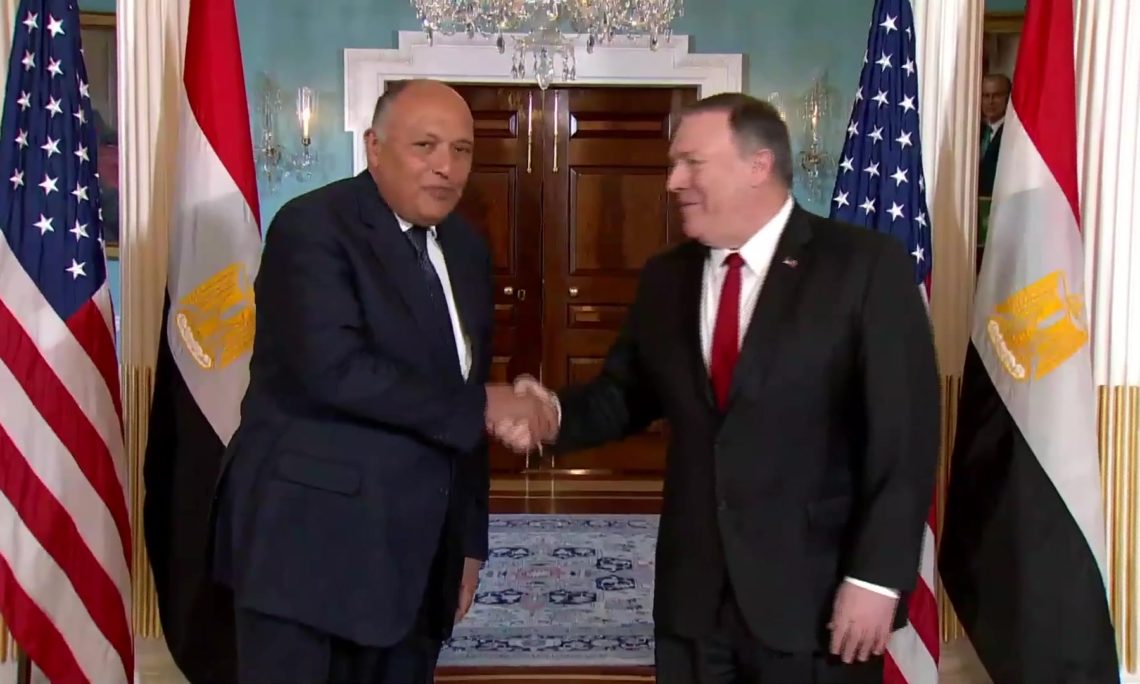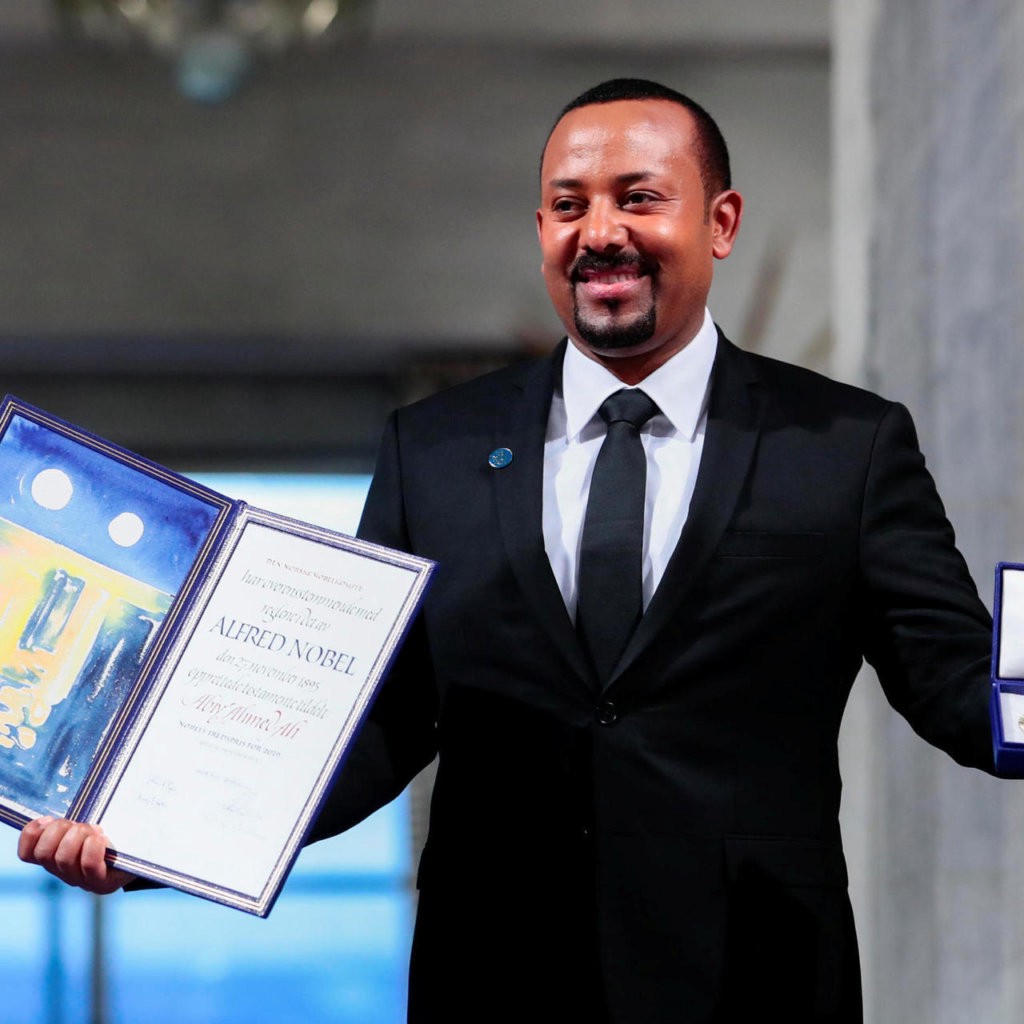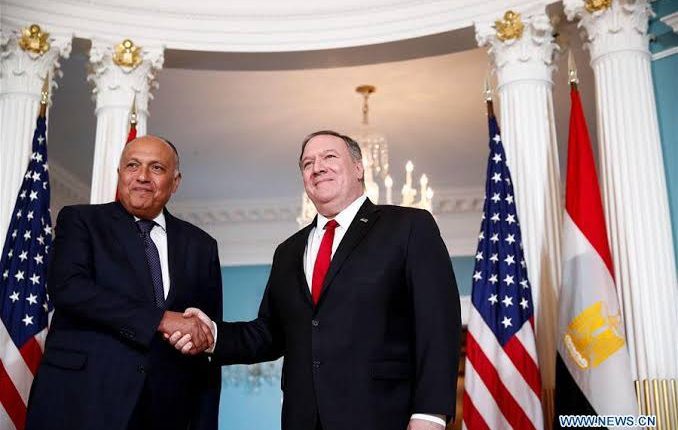
Egyptian Foreign Minister Sameh Shoukry (Left) meeting with American Secretary of State Mike Pompeo (Right)
Since the final end of trilateral talks, mediated by the African Union, between Egypt, Sudan, and Ethiopia, over the Grand Renaissance Ethiopian Dam (GERD), Egypt’s foreign policy has shifted to target international opinion.
Egyptian foreign minister, Sameh Shoukry, has ruled out any return to negotiations due to the start of unilateral filling of the dam by Ethiopia last July. While Egypt can postpone indefinitely–as they have two hydroelectric dams (Sudan has six)–Ethiopia cannot. While 99.8% of Egypt has access to electricity only 30% of Ethiopia has access.
Having realized that Egypt could not prevent the unilateral filling of the dam (their sole means of stalling it) through talks with Ethiopia, the riparian republic had Shoukry go on a world tour to isolate Ethiopia’s prime minister, Abiy Ahmed, and strangle Ethiopia into submission.

Ethiopian Prime Minister Abiy Ahmed accepting the Nobel Peace Prize in 2019
Shoukry has found fertile ground for his message, and, last week, the United States was persuaded to stop aid to Ethiopia. In addition to the United States, on the 19th of September, the Egyptian president, Abdel Fattah El-Sisi, received a letter from the Democratic Republic of Congo’s president, Felix Tschisekedi, expressing his support in the opposition to Ethiopia.
Egypt and Sudan speak of their “natural right” to monopolize the waters of the Nile. Citing the 1959 Water Treaty between London, Cairo, and Khartoum, the riparian two are owed 55.5 billion m3 (for Egypt) and 18.5 billion m3 (for Sudan) of water. This natural right is based on the assumption that England’s imperialism in Africa was legitimate and England rightfully held authority over its waters.
It is an affront to good-faith discourse and the long tradition of anti-imperialism to claim that a slew of mere imperialist legal decorum (African national signatories were colonial representatives). If hypothetically England fairly acquired the consent to wield sole authority over the Nile, and with this authority, fairly gave it to Egypt and Sudan, it would still not hold sway over the GERD. Ethiopia was the one nation not party to these English talks (yet Ethiopia provides 80% of the Nile’s water), and such an antiquated document would mean still be bogus.
Shoukry has told the world that Ethiopia should comply with this draconian treaty even though Ethiopia had no involvement nor gives her consent. However, in 2010, there was the Cooperative Framework Agreement, a democratic and ecologically sustainable result of mutual respect and cooperation, and Egypt opposed this agreement for the sole fact they had to concede control. The CFA cannot bind Egypt but the UK can bind Ethiopia.
The last time Ethiopia tried to build a dam, in 1978, Egypt threatened war to put an end to the project. Egypt is continuing the long tradition of imperialism.
Sources:
Mohammed Abdo Hasanein. “Egypt Seeks to Break GERD Stalemate.” Ashraq Al-Aswat. 30 September 2020. Link.
Ahmed Gomaa. “Congo backs Egypt in Nile dam dispute.” Al-Monitor. 25 September 2020. Link.
Ulf Laessing. Nayera Abdallah. Khaled Abdelaziz. Kevin Liffey. “Egypt and Sudan criticise Ethiopia at start of new Nile dam talks.” Reuters. 28 July 2020.
Dawit Endeshaw. John Stonestreet. “Ethiopia has started filling Grand Renaissance dam on Blue Nile — water minister.” Reuters. 15 July 2020.
”Ethiopia begins filling Grand Renaissance dam on Blue Nile.” Al-Jazeera. 16 July 2020.
Nebiyu Tedia. “In-depth analysis: past agreements on the Nile in view of the law of treaty and the CFA.” Addis Standard. 11 October 2017. Link.
”Sudan Expresses Reservation Over the Ethiopian Unilateral Move of Filling the Dam.” Sudan News Agency. 27 July 2020. Accessed on allafrica.
Lee Keath. Samy Magdy. “AP Interview: Egypt wants UN to avert unilateral fill of dam.” Associated Press. 22 June 2020. Accessed on abcnews.
Muluken Bekele. “Ethiopia’s struggle for equal share of the Nile.” Oromo Patriot. 23 May 2020.
Aidan Lewis. Andrew Heavens. “Factbox: Key facts about Ethiopia’s giant Nile dam.” Reuters. 6 November 2019. Link.
”Agreement between the Republic of the Sudan and the United Arab Republic for the full utilization of the Nile waters signed at Cairo, 8 November 1959.” United Nations. Treaty Series. (Vol. 453|№6519).
Timothy Kaldas. “Why Egypt And Ethiopia Can’t Reach a Dam Deal.” Bloomberg. 23 July 2020.
Muluken Bekele. “Ethiopia’s struggle for equal share of the Nile.” Oromo Patriot. 23 May 2020. Link.
“The South African Economy.” showme.co.za. Accessed 5 November 2019.
Nick March. “Ethiopia’s Abiy Ahmed has to walk a diplomatic tightrope.” The International. 30 September 2020. Link.
Mohammad Rashad Yousef. “Dams on Nile River, High dam in Egypt, Sudan’s Dams, Grand Ethiopian ‘Renaissance Dam’ and its effect on the water budget of Egypt.” Accessed Online 1 October 2020.

